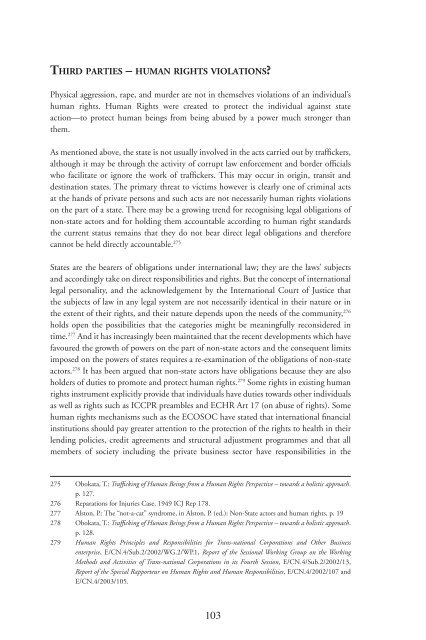Trafficking in human beings: human rights and ... - unesdoc - Unesco
Trafficking in human beings: human rights and ... - unesdoc - Unesco
Trafficking in human beings: human rights and ... - unesdoc - Unesco
Create successful ePaper yourself
Turn your PDF publications into a flip-book with our unique Google optimized e-Paper software.
THIRD PARTIES – HUMAN RIGHTS VIOLATIONS?<br />
Physical aggression, rape, <strong>and</strong> murder are not <strong>in</strong> themselves violations of an <strong>in</strong>dividual’s<br />
<strong>human</strong> <strong>rights</strong>. Human Rights were created to protect the <strong>in</strong>dividual aga<strong>in</strong>st state<br />
action—to protect <strong>human</strong> be<strong>in</strong>gs from be<strong>in</strong>g abused by a power much stronger than<br />
them.<br />
As mentioned above, the state is not usually <strong>in</strong>volved <strong>in</strong> the acts carried out by traffi ckers,<br />
although it may be through the activity of corrupt law enforcement <strong>and</strong> border offi cials<br />
who facilitate or ignore the work of traffi ckers. This may occur <strong>in</strong> orig<strong>in</strong>, transit <strong>and</strong><br />
dest<strong>in</strong>ation states. The primary threat to victims however is clearly one of crim<strong>in</strong>al acts<br />
at the h<strong>and</strong>s of private persons <strong>and</strong> such acts are not necessarily <strong>human</strong> <strong>rights</strong> violations<br />
on the part of a state. There may be a grow<strong>in</strong>g trend for recognis<strong>in</strong>g legal obligations of<br />
non-state actors <strong>and</strong> for hold<strong>in</strong>g them accountable accord<strong>in</strong>g to <strong>human</strong> right st<strong>and</strong>ards<br />
the current status rema<strong>in</strong>s that they do not bear direct legal obligations <strong>and</strong> therefore<br />
cannot be held directly accountable. 275<br />
States are the bearers of obligations under <strong>in</strong>ternational law; they are the laws’ subjects<br />
<strong>and</strong> accord<strong>in</strong>gly take on direct responsibilities <strong>and</strong> <strong>rights</strong>. But the concept of <strong>in</strong>ternational<br />
legal personality, <strong>and</strong> the acknowledgement by the International Court of Justice that<br />
the subjects of law <strong>in</strong> any legal system are not necessarily identical <strong>in</strong> their nature or <strong>in</strong><br />
the extent of their <strong>rights</strong>, <strong>and</strong> their nature depends upon the needs of the community, 276<br />
holds open the possibilities that the categories might be mean<strong>in</strong>gfully reconsidered <strong>in</strong><br />
time. 277 And it has <strong>in</strong>creas<strong>in</strong>gly been ma<strong>in</strong>ta<strong>in</strong>ed that the recent developments which have<br />
favoured the growth of powers on the part of non-state actors <strong>and</strong> the consequent limits<br />
imposed on the powers of states requires a re-exam<strong>in</strong>ation of the obligations of non-state<br />
actors. 278 It has been argued that non-state actors have obligations because they are also<br />
holders of duties to promote <strong>and</strong> protect <strong>human</strong> <strong>rights</strong>. 279 Some <strong>rights</strong> <strong>in</strong> exist<strong>in</strong>g <strong>human</strong><br />
<strong>rights</strong> <strong>in</strong>strument explicitly provide that <strong>in</strong>dividuals have duties towards other <strong>in</strong>dividuals<br />
as well as <strong>rights</strong> such as ICCPR preambles <strong>and</strong> ECHR Art 17 (on abuse of <strong>rights</strong>). Some<br />
<strong>human</strong> <strong>rights</strong> mechanisms such as the ECOSOC have stated that <strong>in</strong>ternational fi nancial<br />
<strong>in</strong>stitutions should pay greater attention to the protection of the <strong>rights</strong> to health <strong>in</strong> their<br />
lend<strong>in</strong>g policies, credit agreements <strong>and</strong> structural adjustment programmes <strong>and</strong> that all<br />
members of society <strong>in</strong>clud<strong>in</strong>g the private bus<strong>in</strong>ess sector have responsibilities <strong>in</strong> the<br />
275 Obokata, T.: Traffi ck<strong>in</strong>g of Human Be<strong>in</strong>gs from a Human Rights Perspective – towards a holistic approach.<br />
p. 127.<br />
276 Reparations for Injuries Case, 1949 ICJ Rep 178.<br />
277 Alston, P.: The “not-a-cat” syndrome, <strong>in</strong> Alston, P. (ed.): Non-State actors <strong>and</strong> <strong>human</strong> <strong>rights</strong>, p. 19<br />
278 Obokata, T.: Traffi ck<strong>in</strong>g of Human Be<strong>in</strong>gs from a Human Rights Perspective – towards a holistic approach.<br />
p. 128.<br />
279 Human Rights Pr<strong>in</strong>ciples <strong>and</strong> Responsibilities for Trans-national Corporations <strong>and</strong> Other Bus<strong>in</strong>ess<br />
enterprise, E/CN.4/Sub.2/2002/WG.2/WP.1, Report of the Sessional Work<strong>in</strong>g Group on the Work<strong>in</strong>g<br />
Methods <strong>and</strong> Activities of Trans-national Corporations <strong>in</strong> its Fourth Session, E/CN.4/Sub.2/2002/13,<br />
Report of the Special Rapporteur on Human Rights <strong>and</strong> Human Responsibilities, E/CN.4/2002/107 <strong>and</strong><br />
E/CN.4/2003/105.<br />
103

















